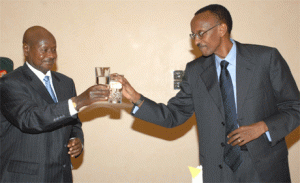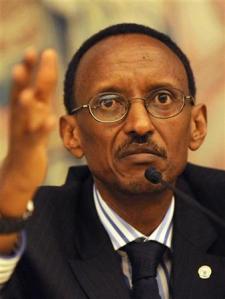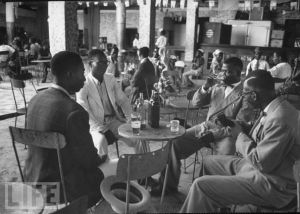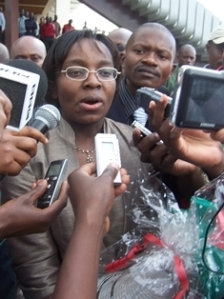Strange Times in Kigali
Source: Christopher Vourlias – March 4, 2010.
I returned to Kigali this week with the hopes of enjoying some downtime before heading to eastern Congo. Sadly, this was not to be the case. As I recently reported, things in everyone�s favorite central African autocracy have taken a turn for the dysfunctional of late, even by this region�s strange standards. Grenade attacks, coup rumors, renegade generals on the run. If it weren�t for the fact that there�s not a beach in sight, I would�ve sworn I was back in Bujumbura.
Front and center has been the bizarre case of Lieutenant-General Kayumba Nyamwasa, a former army chief of staff who � after rumored sightings in Uganda � has apparently resurfaced in South Africa after fleeing the country last week. Kayumba, who was until recently serving as Rwanda�s ambassador to India, has had a strained relationship with the RPF leadership, after he was allegedly linked to a failed coup attempt in 2003. The diplomatic posting seems to reflect the conventional wisdom in Kigali, which is to keep your friends close, your enemies closer, and your failed-coup leaders in India. Uganda�s Sunday Vision reported on Kayumba�s contentious relationship with the government, citing local reports linking him to the troubled Green Party, as well as rumors that �no government official or even fellow soldiers attended the funeral of [Kayumba's] mother recently,� which is a dark tiding indeed for a Rwandan political figure.
Yesterday, a clearly peeved PK gave a press conference here in Kigali, at which he dispelled any rumors that the fleeing general � as well as another former army officer, Patrick Karegeya � had been plotting a coup against him, according to South Africa�s Independent.
�Nobody, absolutely nobody, not even Kayumba, can carry out a coup here. Think about it and you�ll come to the conclusion no one can carry out a coup� in Rwanda, the president said.
�People can only dream about it, wish for it; I believe what I�m telling you,� Kagame said.
Kagame went on to add: �Never ever ever ever ever. Never. Ever.�
The press conference comes on the heels of an announcement by the Prosecutor General Martin Ngoga, who told reporters with a straight face on Tuesday that the Kigali grenade attacks of last month have now been linked to none other than Lt. Gen. Kayumba Nyamwasa and Patrick Karegyeya. This comes after officials stated just hours after the attacks that two suspects had been apprehended, and that, in the definitive words of police spokesman Eric Kayiranga, �they belong to the Interahamwe militia.�
The Rwanda News Agency comments on the sudden about-face.
When three grenades exploded in Kigali two weeks ago and another in Huye district a week before, Police Spokesman Superintendent Eric Kayiranga quickly said investigations showed that Rwandan FDLR rebels were behind them.
The link has not been raised again. On Tuesday, the National Prosecuting Authority suddenly claimed that Gen. Kayumba Nyamwasa and Col. Patrick Karegeya were behind the grenade attacks. On Wednesday, President Kagame said the link between these two scenarios might be possible.
Why would former RPF stalwarts now be canoodling with the Interahamwe? Exactly how many FDLR Hutus do you think are on Lt. Gen. Faustin Kayumba�s Christmas-card list?
Undeterred by the hilarity of their accusations, the RPF today released photographic evidence that Messrs. Kayumba and Karegeya are, indeed, plotting with Interahamwe militia. �We finally have our smoking gun,� said Kagame.
The Kayumba saga comes against a backdrop of increasing intimidation and harassment of opposition politicians, as I�ve reported before. These have included threats most foul against at least three prominent opposition figures � Victoire Ingabire, of the FDU-Inkingi Party; Bernard Ntaganda, of the Parti Social-IMBERAKURI; and Frank Habineza, of the Democratic Green Party � and have (predictably) drawn outraged cries from the international community.
President Kagame, of course, has repeatedly defended his actions, citing the ever-present threat of Hutu rebels to the east and fifth columnists within. In an op-ed for The Guardian, Stephen Kinzer sums up the Kagame position.
He believes western human rights activists underestimate the prospects for a new outbreak of ethnic violence in Rwanda, as well as the danger of allowing ethnically charged speech. �We�ve lived this life,� he said angrily at a news conference. �We�ve lived the consequences. So we understand it better than anyone from anywhere else.�
The levels of intrigue here are�intriguing. Kagame is a master manipulator, who has repeatedly used the genocide as a pretext for bullying the international community and cracking down on internal dissent. The refrain of �we understand it better than anyone from anywhere else� has, in some form or other, become the de facto position of the Kagame administration. It is part of its us-against-the-world mentality, which has always included, as a lingering subtext, a reminder of how the West failed Rwanda during its darkest hour.
The president is a grand strategist, as PR-savvy as any American exec, and observers in this country are always forced to consider how a given event � whether it be grenade attacks in Kigali, or the return of a rabble-rousing exile � is being manipulated by the man upstairs. However damaging or threatening the latest news might seem, you know it is being redacted in His Excellency PK�s enigmatic noggin, before being regurgitated in a way that, ultimately, casts the Kagame regime in an ever more righteous light. Ingabire, for example, has been given a relatively free hand (by Rwandan standards) to state her case to the foreign press. But is Kagame simply holding back because the international spotlight is on her? Or is he playing a more patient hand, perhaps giving Ingabire enough rope to (metaphorically, of course) hang herself?
(The same laissez-faire attitude, unfortunately, has not been extended toward her erstwhile assistant, Joseph Ntawangundi, who just three days after being attacked alongside Ingabire, was promptly arrested and locked up on an outstanding warrant for crimes committed during the genocide.)
I�m not entirely sure what to make of these opposition leaders. Frank Habineza, President of the Democratic Green Party of Rwanda, for example, clumsily played the genocide card while appealing to the West to put pressure on Kagame for his repressive political tactics.
�We do not want the international community to wait, like it waited in 1994,� said Habineza, drawing a parallel that was unlikely to win him many fans. (You can hear more from Habineza here.)
And then there�s Ingabire. I�ve already written a bit about her political aspirations, after spending nearly 16 years in exile in Europe. The would-be president quickly stirred controversy by making some politically charged comments about Hutu victims at the genocide memorial. This more or less occurred while she still had crumbs from the in-flight meal on her chin.
Given such blatantly ethnic posturing � as well as some of the questionable figures looming in her background � it is hard to accept her intentions at face value. Likewise, the clumsy, stage-managed episode involving her supposed asylum request at the UK High Commission makes you wonder whether Ingabire isn�t as much a cool calculator as the man she hopes to dethrone. And you have to ask why someone so deeply concerned with the future of her country waited this long to return, anyway.
Recently Ingabire claimed that if the election were to be held tomorrow, the people would surely vote FDU into power, �because they know who we are.�
I don�t want to take anything away from the average man-on-the-collines here in Rwanda. I would like to give Rwandans � particularly the rural poor, who make up the bulk of this country�s population � the benefit of the doubt, and assume that, come August, they can and will calmly file to the polls with a selfless democratic spirit and full of only the highest of high-minded aspirations.
Unfortunately, that goes against everything I know about electoral politics in this region. Given the amount of time she has had to �campaign� in the country, I suspect most voters don�t know all that much about who Ingabire is. They simply know that she is a Hutu, and in a country where that group still holds a roughly 85 percent majority, she could very well be banking on the fact that that�s all they need to know. You can hardly blame the president, then, for being a bit concerned at the rumblings from below. And you have to wonder just what steps he might take in the next few months to suppress them.
March 7, 2010 No Comments
Victoire Ingabire Confirms That Joseph Ntawangundi Lied About His CV
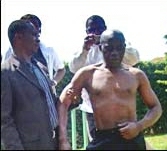
Joseph Ntawangundi arrested
This must be an embarrassing situation for Mrs Victoire Ingabire, Chair of FDU-Inkingi, who is forced to confirm what The Rwandan authorities and their mouthpiece New Times has been claiming about her Assistant Joseph Ntawangundi.
In a press release issued today, Mrs Victoire Ingabire states:
UPDATE ON JOSEPH NTAWANGUNDI�S CASE
Since the arrest of Joseph Ntawangundi on 05th February 2010 and the subsequent incommunicado detention, UDF-INKINGI is conducting its own investigations. At this stage, troubling details about his curriculum vitae raise a certain amount of questions on the information he volunteered before the arrest. This has resulted in regrettable errors in our press release dated 05th February 2010.
Therefore we dissociate ourselves explicitly from the earlier records of his occupational environment, and call on serious investigations.
His lawyer is still trying in vain to obtain a copy of the infamous 2007 in absentia trial. Until proven otherwise, Joseph Ntawangundi is presumed innocent. We call on the government to ensure that he is granted a fair, prompt and public trial.Ms. Victoire Ingabire Umuhoza
Chair UDF-INKINGI
Source: fdu-rwanda.org.
March 5, 2010 1 Comment
Rejoinder To The Article �Will Ingabire Be Rwanda�s Saviour?�

Victoire Ingabire
On 24th February, Mr Andrew Mwenda (independent.co.ug) published an article titled �Will Ingabire be Rwanda�s saviour?�.
I do not share the view of Mr Andrew Mwenda on Mrs Victoire Ingabire Umuhoza. Mrs Victoire Ingabire Umuhoza is a very responsible politician, keen to take the bull i.e. Rwandan tragic past, by its horns in order to forge a better future.
The line of argument developed by Andrew M Mwenda that Mrs Ingabire political stand is irresponsible, rests on questionable assumptions and wrong historical comparison, a false interpretation of the statements made by Victoire on her arrival in Rwanda and a limited understanding of the terms of the debate that Victoire presents as opposed to the political discourse imposed by the incumbent regime.
Questionable assumptions and comparisons.
The statement that it is irresponsible for Victoire to �say that those who ended genocide should stand with those who orchestrated it� and �that victims of genocide should be tried alongside its architects� is based on a misinterpretation of her statement and underlying denial of justice to all Rwandans irrespective of ethnic affiliation. As far as I heard and read Victoire stated that those who committed genocide against Tutsi should be brought to book according to the law and added that for genuine reconciliation to take place once each Rwandan�s pain need to be acknowledged and those who committed war crimes and crimes against humanity against Hutus be tried. I find this to be a normal demand to end impunity which is the root cause of the instability in the Great Lakes region. Denying justice to thousands of people who lost their loved ones is divisive, discriminatory and undermines reconciliation. Crime of genocide, however horrendous, should not give a blank cheque to commit other crimes with impunity especially when the crimes were committed in a coordinated, systematic and premeditated manner. It beats my imagination to equate the call for justice to thousands of Hutus to denying genocide against Tutsi.
What Victoire is saying is no different from what the public is asking, the international community and well wishers for stability in Rwanda have been advancing.
The UN Commission of Experts concluded in its preliminary and final reports (S/1994/1125 and S/1994/1405) on which the Security Council Resolution 955 that set up the International Criminal Tribunal for Rwanda (ICTR) point out that �during the war that followed the assassination of President Habyarimana
“Individuals from both sides to the armed conflict in Rwanda during the period from 6 April 1994 to 15 July 1994 perpetrated serious breaches of international humanitarian law, in particular of obligations set forth in Article 3 common to the four Geneva Conventions and relating to the protection of victims of non-international armed conflicts of 8 June 1977 and that Individuals from both sides to the armed conflict perpetrated crimes against humanity;�.
A report by UNHCR Team headed by Robert Gersony estimated that from April to August 1994, the Rwandan Patriotic Front systematically killed between 25,000 and 45,000 Hutus as it made its way toward Kigali.
According to Human Rights Watch and Amnesty International:
“The crimes committed by RPF soldiers were so systematic and widespread and took place over so long a period of time that commanding officers must have been aware of them.”
…
“RPF soldiers massacred unarmed civilians, many of them women and children, who had assembled for a meeting on their orders”
(Human Rights Watch: http://www.hrw.org/reports/1999/rwanda/Geno1-3-03.htm#P86_35545).
These killings are not just spontaneous anger because in doing so one would excuse the killings carried out by the presidential guard after learning that their President was killed by a Tutsi led rebel movement.
The RPF army is accused of having killed at least four thousand unarmed civilians in Kibeho camp for the internally displaced. See Witness to Genocide — A Personal Account of the 1995 Kibeho Massacre.
In addition, during its invasion of what was then called Zaire, it is estimated that the Rwandan soldiers killed more than 200,000 Hutu refugees. A report by a chillean Roberto Garreton who led investigation was diluted on orders of some powerful members of the Security Council, and forced to remove any suggestion that what happened was genocide, for fear that it would bring trouble to the RPF regime.
In a letter written to the Security Council on the 6th of June 2006, FILDH (F�d�ration Internationale des Ligues des Droits de l�Homme), Human Rights Watch, Lawyers Committee for Human Rights and Rencontre Africaine pour la D�fense des Droits de l�Homme, drew the attention of the Security Council to the fact that in 1994, the RPA killed thousands of civilians, in the process committing war crimes and crimes against humanity, crimes well documented, including by a U.N. Commission of Experts which concluded that the RPA had
�perpetrated serious breaches of international humanitarian law and crimes against humanity.� They warned that �only if the ICTR dispenses justice fully, impartially, and to all parties will it fulfil the purpose for which the Security Council established it, contributing to peace and reconciliation in the region�.
Calling statement made by Victoire Ingabire
Calling for the prosecution of elements of the RPF who committed crimes against humanity should not be construed as asking that �victims of genocide should be tried alongside its architects�. Victims of the genocide are different from criminals who killed Hutu in their thousands. RPF is a political military organisation with a political programme and those who committed crimes should answer them individually. Besides, though it was dominated by Tutsi elite it is not synonymous with Tutsi ethnic group, in the same way that the Hutu led government or the Hutu who killed Tutsi are not synonymous with Hutu ethnic group. Criminals are criminals independent of their ethnic affiliation and should face the law. The International Tribunal for former Yugoslavia has tried criminals from all sides. There is no reason why RPF should be an exception. Double standards based on ethnicity is unacceptable not whistle-blowing to end injustice.
The RPF does not deserve the moral high ground of having stopped genocide.
The UN report that set up ICTR pointed out that the shooting down of the plane that had on board the Presidents of Rwanda and Burundi and their suite triggered the genocide. Though nothing can justify the heinous crime of genocide, the person or persons who carried out that terrorist act are partly responsible for the genocide for they would have known the grave consequences of such a heinous act.
The former U.S. Ambassador to Rwanda, Robert Flatten, testified in June 2005 at the International Criminal Tribunal for Rwanda that he personally warned Gen. Kagame and Pres. Habyarimana that if either resumed war by breaking the Arusha Accords cease fire, they would be responsible for thousands of civilian casualties from retaliatory killings that U.S. State Department documents predicted should the war resume…similar to killings that swept Burundi/Rwanda in 1988.
There is a strong suggestion that the RPF is responsible for it and therefore shared responsibility in the genocide. A French anti terrorist judge Jean-Louis Brugui�re has confirmed this and issued international arrest warrants against the culprits. A Spanish judge, Fernando Andreu, has come to the same conclusion.
Even when the catastrophe struck, the RPF deliberately blocked all attempts to intervene to stop the genocide.
The RPF rejected the invitation made by the military crisis committee, set up on the 7th April 94, for a meeting on the 8th April 1994 with committee, through the UN troops Commander General Dallaire, to discuss how to handle the new crisis. RPF responded by starting a full-scale war on all the fronts, 4 hours before the planned meeting.
The former Deputy UN troops commander in Rwanda Col. Marshall made it clear when testifying before the Criminal International Tribunal for Rwanda on 2/12/2006 that the RPF main preoccupation was military victory at any cost and not to save Tutsi in Rwanda:
�From my experience, my conclusion is that the RPF (Rwandan Patriotic Front) had one goal, seizing power by force and keeping it to themselves�,
�For me, it is the Rwandan Patriotic Front which has perpetrated the attack (shooting the presidential aircraft). Not once, never have I sensed the desire to make concessions, to smooth rough edges, to reach a consensus�.
On the 8th April 19994, the RPF asked all foreign troops to quit within 48 hours declaring they would be considered as enemy combatant if they stayed longer. The Security Council under the pressure of the US, the UK and Belgium, decided to reduce dramatically the UN troops.
On the 12th of April 1994 the RPF rejected a truce offered by the governmental forces in order to fight those who were carrying out massacres of civilian population. Army communiqu� calling on RPA dialogue was signed by Ntiwiragabo, Muberuka, Kanyamanza, Murasampongo, Rwabalinda, Hakizimana, Rwamanywa, Kanyandekwe and Gatsinzi Marcel, now Minister of Defence in Rwanda.
On the contrary the RPF dispatched Dusaidi and Muligande to New York to prevent any foreign intervention.
On the 15th April, a meeting organised by Jacques Bobooh, UN representative, failed to broker a ceasefire because the RPF was deliberately putting forward impossible preconditions, one of which was to ask the army to denounce the interim government and to immediately prosecute those who had committed massacres.
According to Human Rights Watch, on the 30th of April the RPF made a statement opposing UN initiatives for a deployment of international forces in order to help curb the massacres of civilians. Human Rights Watch reveals
�When the Security Council discussed sending a larger peacekeeping force to Rwanda with a broader mandate to protect civilians, the RPF feared that the force might interfere with its goal of military victory. Its leaders may have been particularly concerned that the French might use the force to protect the interim government. Instead of welcoming the move and urging speedy implementation, the RPF spokesman in Brussels opposed it and asserted that there were no more Tutsi to be saved�.
But as HRW testifies thousands of Tutsi were still hiding or in churches calling for help (1999 annual report).
On May 5, 1994, The Washington Times wrote:
“The rebel Rwanda Patriotic Front (RPF) commander said yesterday a U.N. force cannot bring peace to his blood-soaked country and only a guerrilla victory will end the massacres”.
It took another two months for the RPF to take over the country.
Gen. Dallaire, commander of the UN forces in Rwandan (UNAMIR), testified under oath before the International Criminal Tribunal for Rwanda, that Gen. Paul Kagame told him that those civilian killings are “collateral damage” for his war plan.
On 12 November 2005 the RPF spokesman Mr Severian Sebasoni told BBC Great Lakes radio that RPF objectives was not to be like Red Cross saving people but to take the power.
The issue of ethnicity in Rwanda
Andrew M. Mwenda points out that �given the emotive power of ethnicity especially in Rwanda, it is easy to rally a political following by making ethnic claims, something that is �also extremely dangerous�. If a claim to justice for all is �extremely dangerous� in a society, then there must be something fundamentally wrong that must be addressed for such society to survive.
My view is that the Rwandan society must take the bull by its horns by accepting its past looking at it critically and accept each one�s responsibility. Throwing the bucket at each other for what went wrong in Rwanda does not help nor does the story line of the good and bad guys portraying Hutus as �Hutus extremist killers, while the Tutsis of the RPF are portrayed as avenging angels, who swooped in from their bases in Uganda to stop the genocide�
I believe that ethnicity is not a problem in itself; the problem is lack of the rule of law, democracy and equal opportunity. Once the three conditions are present, the importance of ethnicity will disappear.
It is an open secret that the RPF has used the slogan on national unity to prevent any criticism of its policies and to stifle dissenting voices. This cannot augur well for the future of the country. It can only push dissenting voices underground.
March 3, 2010 2 Comments
London Manifestation of Rwandans For Cessation of RPF Harassment in Rwanda
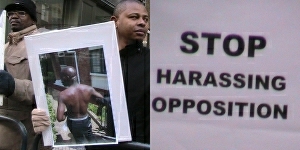
Some banners at London Manifestation
LONDON – On Wednesday 10th February 2010, a group of Rwandans and Congolese from DRC convened from 2.00 pm at the High Commission of Rwanda in UK to protest against the regime of Kigali for harassing Rwandan political opponents.
The manifestation took place in front of the Rwanda House located at 120 � 122 Seymour Place, London W1H.
Slogans on the displayed banners included the following messages: �Democracy for Rwanda Now, Stop Harassing Opposition, Free Joseph Ntawangundi Now.� On some of the banners were pictures showing Joseph�s scars after the beating by RPF militia in Kigali on 3rd February 2010.
The protesters find that people have been patient enough about the crimes and abuses of human rights by the RPF regime against Rwandans.
They are very much inspired by the courageous determination of Mrs Victoire Ingabire Umuhoza, Chair of United Democratic Forces UDF-Inkingi, to politically and pacifically challenge the Kagame regime in Rwanda. They told news reporters that what Victoire Ingabire has started won�t stop until Rwandans have democracy, justice and respect of the basic human rights they have been denied for the last 20 years because of RPF. They expect the world to know more about their suffering and help them make pressure on Paul Kagame to change his policies towards the Rwandan population.
Congolese who joined the protest are fed up by the ongoing humanitarian crisis in the Great Lakes region where occur recurring wars sponsored by international interests in the mineral resources of DRC. All recognize that RPF is the source of all the tragedies in the whole region and agree that re-instauring democracy in Rwanda will greatly ease the suffering of so many millions in the region.
February 11, 2010 2 Comments
Victoire Ingabire summoned by Criminal Investigation Department
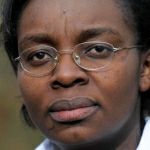
Victoire Ingabire
KIGALI – Victoire Ingabire, leader of the opposition party FDU-Inkingi was yesterday summoned and interviewed by the Criminal Investigation Department (CID) at the Police Headquarters in Kacyiru.
The details of the investigations have not been clarified by the Police.
Victoire Ingabire was questioned and was later allowed to return home.
The Rwanda News Agency quoted Kagame on Monday as charging that Ingabire was “making comments and doing all her activities illegally and as an ‘individual’ because her party has not been registered.”
Victoire Ingabire who was in the company of her lawyer Protais Mutembe during the questioning, declared afterwards to the BBC that the questioning was related to her views about genocide and crimes against humanity and her alleged relationship with the FDLR rebels.
Victoire Ingabire who returned to the country last month after 16 years in the Netherlands, has been an outspoken critic of the RPF government. She has angered Paul Kagame’s regime when she declared that Hutu who have been killed during the genocide should also be remembered and their killers brought to justice. They consider her declarations as �divisive and revisionist� and espousing the double genocide theory.
Last week, Ingabire and her assistant Joseph Ntawangundi were attacked by RPF militia at Kinyinya Sector.
Since then, Joseph Ntawangundi has been jailed as a 2007 Gacaca court convict for genocide crimes. Joseph protests his innocence and his party FDU-Inkingi claims he could not have committed such crimes as he was not in Rwanda in 1994.
These series of incidents are meant as intimidation tools meant to harass people, discourage any meaningful opposition and undermine the advent of democratic rule in Rwanda.
February 11, 2010 No Comments
Kigali – Case of Joseph Ntawangundi: Another Evidence of Gacaca Courts Farce in Rwanda.
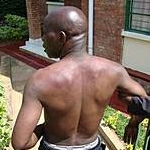
Ingabire's Assistant beaten-up
After her assistant Joseph Ntawangundi was put in police custody following revelations by the New Times that he was a ‘Gacaca fugitive’ already sentenced to 19 years jail, the opposition leader Victoire Ingabire, chair of the UDF-Inkingi alias FDU-Inkingi issued a statement stressing that this is another shameful propaganda based on lies in the Gacaca system.
Here follows Ingabire�s press release:
NEW TIMES, A JUDGE AND JURY, EXPLOITING FORGED GACACA EVIDENCE, TO MAKE MORE VICTIMS.
We read with utmost concern, the New Times of Saturday, 6th February 2010. The fire spitting media has unveiled its true colors. The title on the front page �Ingabire�s assistant a Gacaca fugitive� alleging that Joseph Ntawangundi was sentenced to 19 years in absentia, is sheer lies.
Joseph Ntawangundi left Rwanda in 1986 for studies in Poland (Wroclaw), returned to Rwanda in 1992 and worked in Kigali (CESTRAR). In 1993, he left Rwanda for ICFTU – AFRO (international confederation for free trade unions, African Regional Organisation, NAIROBI, Kenya) as a Research and Training Officer until 2002. During the genocide, Mr. Joseph Ntawangundi was attending, on behalf of the ICFTU � AFRO, a 2-month training course in Sweden (GANGNEF) and returned to Kenya.
He never officiated in the education sector in Rwanda, in any capacity whatsoever. He has never been school director in Gitwe during the genocide, as claimed by the paper. Either the reporters have been mislead, or they deliberately want to mislead the readers for their own agenda.
Since Mrs. Victoire Ingabire Umuhoza returned to Rwanda, this paper has been recklessly issuing fabricated stories without giving any chance of counter evidence, in total disregard of media ethics.
I challenge the paper to produce any evidence of its allegations, at least for the sake of the readers’ respect. Else, let it give a right of answer to Mr. Joseph Ntawangundi.
Even if our position about GACACA has not changed, we hope that it has not fallen this low to condemn an innocent who was not even in Rwanda during the genocide, and for crimes committed in a place he has never been to.
Meanwhile, we’ve just learnt that Mr Joseph Ntawangundi has been picked up by the police and is currently held at Remera police station. This shows the kind of relationship between New Times and security forces which rely on libels from this paper.
We would like to recall that Mr Joseph Ntawangundi is still recovering from injuries sustained on 3rd February 2010, following attacks in government premises in Kinyinya sector. He is expecting justice, not mob justice.
UDF INKINGI
Mrs. Victoire Ingabire Umuhoza
Chairperson
February 8, 2010 1 Comment
Lies and Gacaca As Main Weapon Against Political Opposition in Rwanda
The New Times newspaper of spreading false propaganda about her aide, Joseph Ntawangundi.
A few days after Victoire Ingabire and her assistant Joseph Ntawangundi were nearly lynched by a rowdy group of local militia in the administration offices, the New Times newspaper – mouthpiece of the ruling RPF party of President Paul Kagame – reported that Ntawangundi was a fugitive long wanted by the Gacaca court on charges related to the 1994 genocide.
Here is what The New Times (http://www.newtimes.co.rw/index.php?issue=14163&article=25610) publishes in an article titled:
Ingabire�s assistant a Gacaca fugitive:
� Handed 19 yrs in absentiaKIGALI – Victoire Ingabire�s assistant, Joseph Ntawangundi, the man who came to the limelight in the saga at Kinyinya Sector, is a wanted Genocide fugitive who, in 2007, was sentenced in absentia to 19 years in prison by a Gacaca Court.
Ntawangundi was found guilty by the Gacaca court in Rusenyi cell, Gitwe sector in the former Kibungo Province, present day Ngoma, for killing two young people only identified as Nsabimana and Hategeka.
The two were students of IAVE Gitwe Secondary School in Kibungo where he was a director at the time. He was also found guilty of conspiring with militias to murder eight other people.
According to Beline Uwineza, the coordinator of Gacaca in the Eastern Province, Ntawangundi fled in 1994 to Benaco Refugee Camp in Tanzania before finding his way to Europe.
�His file and arrest warrant have been around. His case was a category two type. We were surprised when we saw his pictures in the news media after all these years,� she said.
�The arrest warrant is still valid of course. The next step will be to make sure he serves his jail term. Gacaca will do everything within its means to bring him to book�.Witnesses testified that Ntawangundi being the director of the school, many students ran to him for protection during the Genocide, but that he kept turning them away and they would then be killed by militias lurking outside.
The two children he killed had also run to him for protection.
He is one of the thousands of people whom Gacaca has sentenced in absentia.
This is the second time that someone connected to the presidential aspirant is discovered to have links to the killings of innocent people during the 1994 genocide against the Tutsi.
Ingabire�s own mother, Therese Dusabe, had also been found guilty earlier on two separate occasions and sentenced to 30 years and life respectively.
According to FDU-Inkingi’s chair Victoire Ingabire, this Gacaca story is a pure lie as Joseph Ntawangundi had left Rwanda in 1993! Read Victoire Ingabire’s press release explaining why in the article: Kigali � Case of Joseph Ntawangundi: Another Evidence of Gacaca Courts Farce in Rwanda.
This is again another proof that the Kagame regime would continue to recourse to any sort of of lies and character assassination propaganda, in order to bar the opposition from fairly challenging him in the upcoming presidential elections.
February 8, 2010 No Comments
Kigali-Rwanda: Calendar Of Upcoming Presidential Elections Released
KIGALI – The National Electoral Commission (NEC) has released an updated calendar of the upcoming presidential elections detailing dates for the series of events that will lead to the August 9 Presidential Polls.
The electoral code that is currently in parliament is expected to be promulgated soon and published in the official Gazette.
Here are the key dates for the events that will lead to the August 9 Presidential Polls:
- Between June 24 and July 02: Nomination of presidential candidates
- July 07: Declaration of the final list of candidates approved by NEC.
- July 20: Nominated candidates will start campaigning
- August 08: End of electoral campaign
- August 09: Presidential polls.
- No later than August 17: Final declaration of presidential election results and announcement of the winner.
Note that one newcomer in the Rwandan politics, Mrs Victoire Ingabire Umuhoza, has already been designated by her still-to-be-registered FDU-Inkingi party as their presidential candidate and is already in Rwanda, trying against all odds to register her party in order to challenge the redoutable RPF candidate Paul Kagame.
February 8, 2010 No Comments
Rwanda Opposition Leader Victoire Ingabire Demands Protection Ahead of Presidential Elections

Victoire Ingabire
Kigali – After escaping the militia-like attack against her yesterday, the leader of Rwanda�s opposition United Democratic Forces (UDF-Inkingi), Victoire Ingabire, asks the Rwandese government to protect her ahead of the scheduled August general election.
Here is how Victoire Ingabire, the leader of Rwanda�s opposition United Democratic Forces recounts her story through an interview by Peter Clottey of Voice of America News:
�Today, I received a call from the mayor of the sector where I live, Kinyinya, and he told me that I have to return my ID. And when I arrived in his office, there were younger people who began to batter us, me and one of my colleagues. And they took my bag. (Then,) I went back quickly to my car, but my colleague stayed back and they battered him. And after (that, I) took him to hospital,� she said.
Ingabire accused the police of failing to stop the attack:
�When they battered us, the police were there and they didn�t do anything. They watched us (as) the young people battered us,� she contended.
Ingabire said the ruling party wants to undermine her campaign ahead of the forthcoming presidential elections.
�We see that the government of General Kagame does not accept all political activities in our country. You know that I have been back to the country now three weeks ago, and they are doing everything to prevent (me) from participating in the election. They know that the population needs the change and they know that the population wants (me) to participate in the election, and they want me as the leader of them. This is why they (will) do everything that people will be afraid to come to me,� Ingabire said.
Some Rwanda�s opposition groups have condemned the attack and accused President Kagame�s ruling Rwanda Patriotic Front party (RPF) of masterminding it. After visiting Ingabire�s injured assistant at the King Faycal Hospital, they have vowed to defeat the ruling party in the upcoming election.
Listen to what Victoire Ingabire says.
Source: VOA News
February 4, 2010 No Comments
Victoire Ingabire Denounces Harassments By Rwandese Government
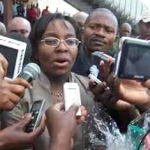
Victoire Ingabire
Victoire Ingabire has sent on Wednesday a protest letter to the Rwandese government, denouncing what she called: �administration backed lynching and harassments by sections of secret services, the police and the army.�
Here is the content of the letter sent:
�Today at 11:25, responding to an invitation by the authorities of Kinyinya Sector (Gasabo District) to collect our administrative papers, Mrs. Victoire Ingabire Umuhoza, the Chairperson of UDF-INKINGI narrowly survived a prepared lynch mob. Within the administration premises, my assistant, Joseph Ntawangundi, was savagely dragged out of the car, beaten and stabbed. It is only after one hour that the police stopped the lynching.
I escaped the mob. The militia snatched my handbag containing my identity card, my passport, and other valuable belongings. Joseph Ntawangundi severely injured, his clothes torn apart was rushed to King Faycal Hospital for emergency treatment.
This is just the latest in a growing list of blatant attacks and harassments that compromise public confidence in our security systems. Militia lynching, the reign of terror being carried out by certain sectors of the administration, security services and the police forces are unacceptable.
It is with great regret that we must take issue with the on-going aggressive surveillance and tailing by Secret Services and Army officers coupled with police harassments and intimidation against the UDF-INKINGI leader, Mrs. Victoire Ingabire Umuhoza.
We mainly refer to these other incidents:
� Wednesday 27th January 2010, Nyagasambu (Kigali). Exercising our rights to freedom of movements in our country, our two vehicles were ordered by police officers to pull off. Drivers� Licenses and vehicles registration papers were confiscated. The official charge was �careless driving� and a FRW 50,000 fine was levied. Unable to substantiate the allegations on spot, the officers confirmed that they received orders from their hierarchy to stop our vehicles.
� The same day, we have been tailed by an army vehicle with men in uniforms between Rwamagana and Kibungo and all the way back. The mobile surveillance continued with cars wearing civilian plates. The surveillance was extensively carried on in an intimidating fashion even while shopping vegetables in both Rwamagana and Kibungo public markets.
� Sunday 17th January 2010, 2 manned vehicles tailed us from Kigali to Gitarama and all the way back;
� Since 16th January 2010 to date, we have been submitted to a 24-hour intensive surveillance.
We call on all relevant authorities to investigate the militia lynching within Kinyinya Sector premises, harassments by sections of Secret services, the Police and the military. It is time the authorities take action and ensure we are allowed to carry out our work and to enjoy our rights to free movements without any harassment.
We don�t believe this brutality, terror, militia lynching and those harassments are, for some reason, beyond the control of the government.�
This letter was addressed to Hon. Minister of Local Government, Hon. Minister of Defense, Hon. Minister of Internal Security, RDF Commander and Commissioner General of Police with copies to H.E. General Paul KAGAME (President of Rwanda), The Right Hon. Mr. Bernard MAKUZA (Prime Minister) and Diplomatic Missions in Kigali.
The formerly exiled opposition politician returned to Rwanda on January 16 and has publicly expressed her intentions of challenging President Paul Kagame during the forthcoming presidential elections.
February 4, 2010 No Comments

